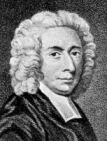Isaac Watts – Rejected Suitor

Isaac had butterflies in his stomach as he paced nervously around the room. Today was the day he would meet Elizabeth Singer for the first time. Several months ago Elizabeth, a noted poet in her own right, wrote to tell Isaac how moved she was by his work. Isaac replied, and through the next several months of correspondence the two fell in love—there was even talk of marriage.
Isaac Watts was a natural poet. As a young child, his odd habit of conversing entirely in rhyme sometimes annoyed his parents. Rhyming had become so natural for him that when faced with a whipping for his incessant verse, he said without thinking:
And I will no more verses make.
Isaac’s love of beauty in the written word caused him to cringe at the ugly and unpolished versions of the Psalms sung in the churches of his time. He complained to his father that they were not befitting the solemn dignity and beauty of the worship service and were an unfit offering to God. When his father charged him to either stop complaining or write something better, Watts accepted the challenge. Hymn writing became his passion. His congregation happily accepted the new songs, though some church leaders opposed his efforts to modify the existing clumsy church hymnody so that, as Samuel Johnson said, “elegance might consist with piety.”
Ironically, though Isaac had great love for beauty, his personal appearance was anything but lovely. He was only about five feet tall, with yellowish skin. His head was disproportionately large for his frail body, and boasted a large, hooked nose and small gray eyes.
Indeed, when he did meet Elizabeth Singer in person, she could not get past his looks. And when he offered marriage, she turned him down. “If only,” she lamented, “I could say that I admire the casket as much as I admire the jewel it contains.” Disappointed, Watts contented himself to be her friend and remained unmarried for the rest of his life. He accepted that the Divine Hand of providence worked even in this rejection. Later, in writing to a friend he said:
I am persuaded, that in a future state we shall take a sweet review of those scenes of providence, which have been involved in the thickest darkness, and trace those footsteps of God when he walked with us through deepest waters. This will be a surprising delight . . . to have those perplexing riddles laid open to the eyes of our souls, and read the full meaning of them in set characters of wisdom and grace.
And so, through this Divine Providence, Elizabeth Singer missed the chance to marry the man some call the most influential of his generation. For certainly God and the church did not reject Isaac Watts for his lack of physical beauty. Open any hymnbook in the English-speaking world and you will nearly always find one, if not a score, of the 600 hymns written by Isaac Watts during his lifetime. Some of the more popular include “Joy to the World,” “O God Our Help in Ages Past,” “I Sing the Mighty Power of God,” and “When I Survey the Wondrous Cross.” His hymns became anthems for the Great Awakening and are still popular over 300 years later. As George MacDonald said, “Some of his hymns will be sung, I fancy, so long as men praise God together.”
In addition to his work as the “Father of English Hymnody,” Isaac Watts published 52 items on diverse subjects including astronomy, psychology, grammar, and logic. He held a long correspondence with Jonathan Edwards during the Great Awakening in the colonial United States and commissioned Edwards’ detailed description of those events. Watts’ friends included such notable figures as John and Charles Wesley, George Whitefield, Lady Huntingdon and Cotton Mather. Benjamin Franklin published a book of Watts’ hymns. C. H. Spurgeon grew up learning Watts’ catechism and hymns and recommended both to his congregation.
Isaac Watts said, “The mind’s the measure of the man.” If this is true, the diminutive pastor Isaac Watts was a giant.

